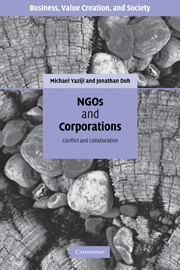Book contents
- Frontmatter
- Contents
- List of figures
- List of tables
- Preface
- Foreword
- Acknowledgments
- Part I Understanding NGOs
- Part II NGO advocacy campaigns
- Part III Corporate–NGO engagement
- 7 Corporate–NGO engagements: from conflict to collaboration
- 8 Globalization, multinationals and NGOs: the next wave
- Case illustration: conflict diamonds
- Case illustration: Unilever in Indonesia
- Case illustration: microfinance and poverty reduction
- Part IV The future of corporate–NGO relations
- Index
- References
8 - Globalization, multinationals and NGOs: the next wave
Published online by Cambridge University Press: 13 January 2010
- Frontmatter
- Contents
- List of figures
- List of tables
- Preface
- Foreword
- Acknowledgments
- Part I Understanding NGOs
- Part II NGO advocacy campaigns
- Part III Corporate–NGO engagement
- 7 Corporate–NGO engagements: from conflict to collaboration
- 8 Globalization, multinationals and NGOs: the next wave
- Case illustration: conflict diamonds
- Case illustration: Unilever in Indonesia
- Case illustration: microfinance and poverty reduction
- Part IV The future of corporate–NGO relations
- Index
- References
Summary
The process of globalization is not a new phenomenon, but stretches back centuries. Globalization, on the other hand, encompasses a vision of integrating social, political, economic, cultural and technological aspects to create a unified world market. According to Friedman, as globalization becomes a household word, the world will continue to “flatten” until the globe is virtually an integrated web. However, as the world becomes more integrated, it poses different challenges for established and emergent institutions. Corporations may find it easier to reach the global marketplace, but the myriad of cultures, social values and political structures will leave them vulnerable to NGOs that may not agree with their behavior and conduct.
Globalization and its many reverberations pose new challenges for multinational corporations (MNCs) and NGOs. Debates over the negative spillovers of globalization have not just permeated, but at times dominated, the popular business press. Dozens of books have been published in recent years addressing globalization and its varied impacts, and many of these volumes have become bestsellers. Photographs of police clashing with protesters at meetings of the WTO, the World Economic Forum, the joint meetings of the World Bank and IMF, and many other global assemblies, have been featured on the covers of major dailies and weeklies throughout the world. NGOs have provided the vehicle for organized advocacy in support of a variety of interests impacted by globalization trends.
- Type
- Chapter
- Information
- NGOs and CorporationsConflict and Collaboration, pp. 146 - 161Publisher: Cambridge University PressPrint publication year: 2009



